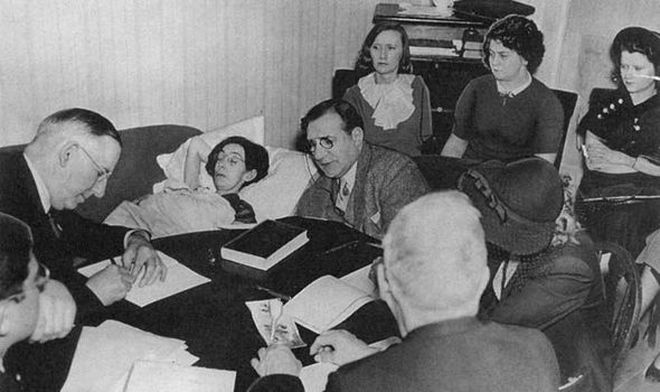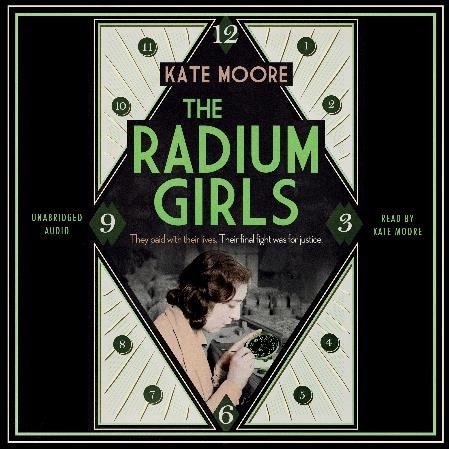 So excited today to interview Author Kate Moore talking about courage, and her soon-to-be-released-in-the-US book THE RADIUM GIRLS: THE DARK STORY OF AMERICA'S SHINING WOMEN. (Audio Book cover below) Young women hired to paint glow-in-the-dark numbers on wrist watches in the 1910-20s were (in)dispensable to United States Radium, a manufacturer of one of the hottest new products of the era. 'The first thing we asked was, “Does this stuff hurt you?” And they said, “No.” The company said that it wasn’t dangerous, that we didn’t need to be afraid.’ Catherine Donohue and co-workers died of that "stuff." Their courage established a precedent that led to workers' rights to hold their employers accountable when their job makes them sick. I asked Kate Moore, what was it like to uncover the details of these women's fight for acknowledgement of their suffering? Kate Moore: "Well, it was extraordinary. And a real privilege – to feel like I was learning what they’d been through. It was particularly striking because for nearly a century no one had listened to their voices and words that were there in the archives all along. It was shocking to realize how cruelly they had been treated. It was sobering to uncover what they’d suffered physically. And it was inspiring to learn that despite all this they never gave up fighting and were always there for each other." 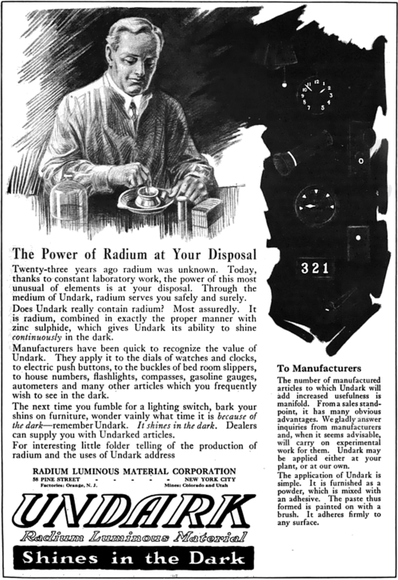 During WWI, U.S. Radium produced a high-tech paint containing radium called Undark which allowed U.S. soldiers to read their wristwatches and instrument panels at night. After the war the company used Undark to manufacture a variety of products from buckles on bedroom slippers to gasoline gauges. While scientists began to learn more about the dangers of radium, the corporation continued to tell the public it was safe in small quantities. But the factory women were exposed to much higher levels. Their clothing often glowed when they arrived home from work, and some women painted their fingernails with the fizzy, shining paint. When they began to sicken and die, nobody believed them when they said Undark was killing them. New hires at U.S. Radium, many of them teenagers, were trained to suck the tip of their paintbrush to achieve a fine point in order to coat radium on the tiny numbers of wrist watches. Like clockwork, they painted hands and digits on some 200 watch faces a day at five cents a piece, a good income at the time. The tiny amounts of radium they swallowed before painting each numeral acted like calcium stored away in their bones, except it didn't strengthen their bones, it diseased them, bombarding radiation throughout their bodies. 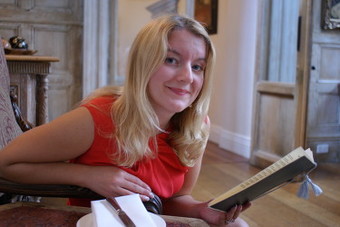 Kate (right) learned in her research that male lab technicians working in the very same company must have known something the women didn't. Company chemists used lead screens, masks, and tongs when working with the paint. Five women won their lawsuit against the company in the 1930s, but they were shunned by neighbors, and forty years later men at the company still believed the women had been lying. 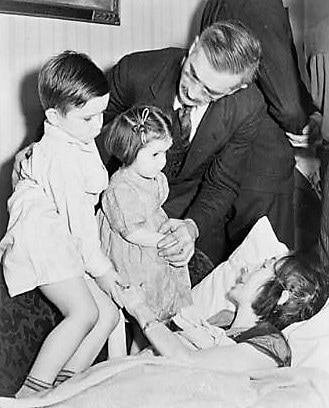 Associate Press photo of Catherine, Tom Donohue and their children. Associate Press photo of Catherine, Tom Donohue and their children. Kate Moore: I tried to empathise with the women as deeply as I could. Their letters and interviews obviously give an incredible insight into them. So I did feel, as best I could, that I knew Catherine. I had to, in order to write her story. There were two things that struck me. The first was how ordinary she was, in a way: a mother, a wife, a friend. A woman who got lonely when no one could visit her in a distant hospital. A woman who got worried when her husband couldn’t find work. The second, of course, was how extraordinary she was: the way she kept fighting for her children, her husband, her friends. Catherine Donohue fainted during a court hearing when a doctor described how she had no hope of recovering from radium poisoning. Later lawyers visited her at home, as she testified from her deathbed. 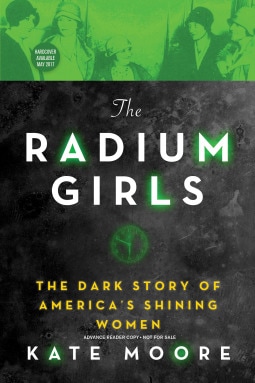 www.amazon.com/Fannie-Never-Flinched-Struggle-American/dp/1419718843Kate Moore:The photographs of her from June 1938, shortly before her death, show how emaciated she was, yet her spirit burned so strongly inside her, despite the weakening of her body. She was determined never to give up. Journalists talked of their surprise at the passion in her voice because of the frailty of her body. She fought to the death for this cause. Catherine said her faith sustained her. I think a lot of it was also to do with friendship. She had seen friends die from the same cause that had made her sicken and I think she was determined to hold the company to account. What these women went through physically was horrific: losing their teeth and jawbones, constantly pus-seeping mouths, broken limbs and backs, huge tumors. They were crippled and killed. And they knew the company was to blame. So I think the sheer injustice of it also fired their courage. Thank you, Kate! I appreciate you taking the time for an interview. Five dial painters sued the Orange, New Jersey defense contractor for $250,000 each, but couldn't wait for trial delays and roadblocks engineered by the company. They were dying. After initial hearings in 1927, the women accepted a mediated settlement, $10,000 per woman, plus legal and medical expenses, and a $600 per year annuity for as long as they lived. U.S. Radium ended up paying few annuities. You can pre-order the book here... Reminder: In celebration of Women's History Month, I'm giving away a copy of Fannie Never Flinched, a CD of Labor Singer Anne Feeney and a free Skype Author visit to your book group, union meeting, library or school. Enter here... 2/18/2021 02:46:19 am
There are many watches available in the market but patek philippe watch is one of the best brand many shopkeeper feel proud to sell patek philippe in their shop because it is light weight and the strap is very smooth as compare to other watches. Comments are closed.
|
I'm fascinated to discover little-known history, stories of people and events that provide a new perspective on why and how things happened, new voices that haven't been heard, insight into how the past brought us here today, and how it might guide us to a better future.
I also post here about my books and feature other authors and their books on compelling and important historical topics. Occasionally, I share what makes me happy, pictures of my garden, recipes I've made, events I've attended, people I've met. I'm always happy to hear from readers in the blog comments, by email or social media. Archives
September 2023
Categories
All
|
